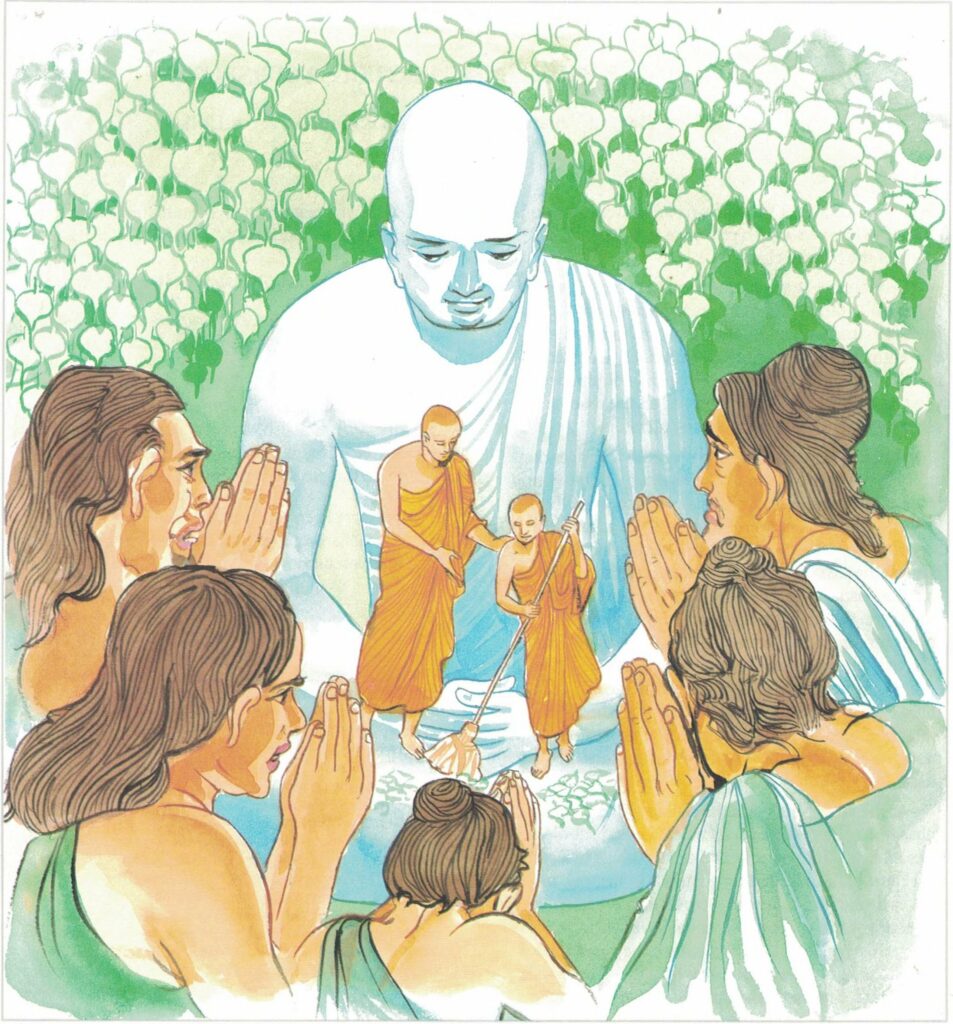Pali text, illustration and English translation of Dhammapada verse 159:
attānañce tathā kayirā yathaññamanusāsati |
sudanto vata dammetha attā hi kira duddamo || 159 ||
159. As one teaches others so should one do oneself. Well-tamed, one may others tame, to tame oneself is hard.

The Story of Venerable Padhānikatissa
While residing at the Jetavana Monastery, the Buddha spoke this verse, with reference to Venerable Padhānikatissa.
Venerable Padhānikatissa, after taking a meditation topic from the Buddha, left for the forest with a large number of other monks. There, he told the monks to be ever mindful and diligent in their meditation practice. After thus exhorting others he himself would lie down and go to sleep. The young monks did as they were told. They practiced meditation during the first watch of the night and when they were about to go to bed, Padhānikatissa would get up and tell them to go back to their practice. When they returned after meditation practice during the second and third watches also he would say the same thing to them.
As he was always acting in this way, the young monks never had peace of mind, and so they could not concentrate on meditation practice or even on recitation of the texts. One day, they decided to investigate if their teacher was truly zealous and vigilant as he posed himself to be. When they found out that their teacher Padhānikatissa only exhorted others but was himself sleeping most of the time, they remarked, “We are ruined, our teacher knows only how to scold us, but he himself is just wasting time, doing nothing.” By this time, as the monks were not getting enough rest, they were tired and worn out. As a result, none of the monks made any progress in their meditation practice.
Having completed residence, they went back to the Buddha. The Buddha, after exchanging the usual friendly greetings with them, asked them, “Monks, did you observe heedfulness? Did you perform your meditations faithfully?” Then the monks told him the whole story.
The Buddha said, “Monks, if a man is to admonish others, he must first subdue himself; for if, under these circumstances, he admonishes others, being well subdued himself, he can subdue others.”
Explanatory Translation (Verse 159)
aññaṃ yathā anusāsati ce attānaṃ tathā kayirā
vata sudanto dammetha attā hi kira duddamo
aññaṃ [añña]: others; yathā: in what manner; anusāsati: you instruct; ce attānaṃ [attāna]: you yourself; tathā: in that manner; kayirā: must behave; vata: certainly; sudanto [sudanta]: the best disciplined person; dammetha: will discipline others; attā hi kira: one’s own self indeed; duddamo [duddama]: is difficult to be disciplined.
If you are keen to discipline others in the same way, you must yourself behave in that manner. It is the best disciplined person who will discipline others best. The most difficult to be disciplined is one’s own self indeed.
Commentary and exegetical material (Verse 159)
attānaṃ tathā kayirā: you yourself must behave that way. This is said in relevance to those who instruct others, and yet behave contrary to that advice themselves. The Buddha himself is the most supreme example to emphasize this attitude. The Buddha’s beneficent and successful ministry lasted forty-five years. From His thirty-fifth year, the year of His Enlightenment, till His death in His eightieth year, He served humanity both by his way of life and by precept. Throughout the year He wandered from place to place, at times alone, sometimes accompanied by His disciples, expounding the Dhamma to the people and liberating them from the bonds of saṃsāra. During the rainy season (vassāna) from July to November, owing to incessant rains, He lived in retirement as was customary with all ascetics in His time.
The Buddha’s emphasis was doing it oneself–being practical. He never limited his mission to sermonizing alone. He set an example of practice. Those with most understanding know that the attainment which the Buddha attained, is open to all who devote themselves to the earnest practice of His Teachings. That, in fact, every human mind has the possibility to find beneath the ages-old accumulation of rubbish, the jewel of wisdom. It is in this that one may find the most secure refuge. The Buddha Himself said: “Go to no external refuge.” Thus the last Buddha to appear in this world was Gotama and He inspired His followers both monk and laity to become as He had become, to model their life and practice on His own since the latter has Supreme Enlightenment as its basis. It was open to anyone, He declared, to observe the precepts, to attain the concentrations, to cut off the false ego-sense and to blossom forth in the splendour of enlightenment. The Buddhas do not set their followers on a lower level and themselves upon an unattainable peak of supremacy but encourage them in many skilful ways to attain what they have attained, as this is something practical, something for each wise man to experience for himself.